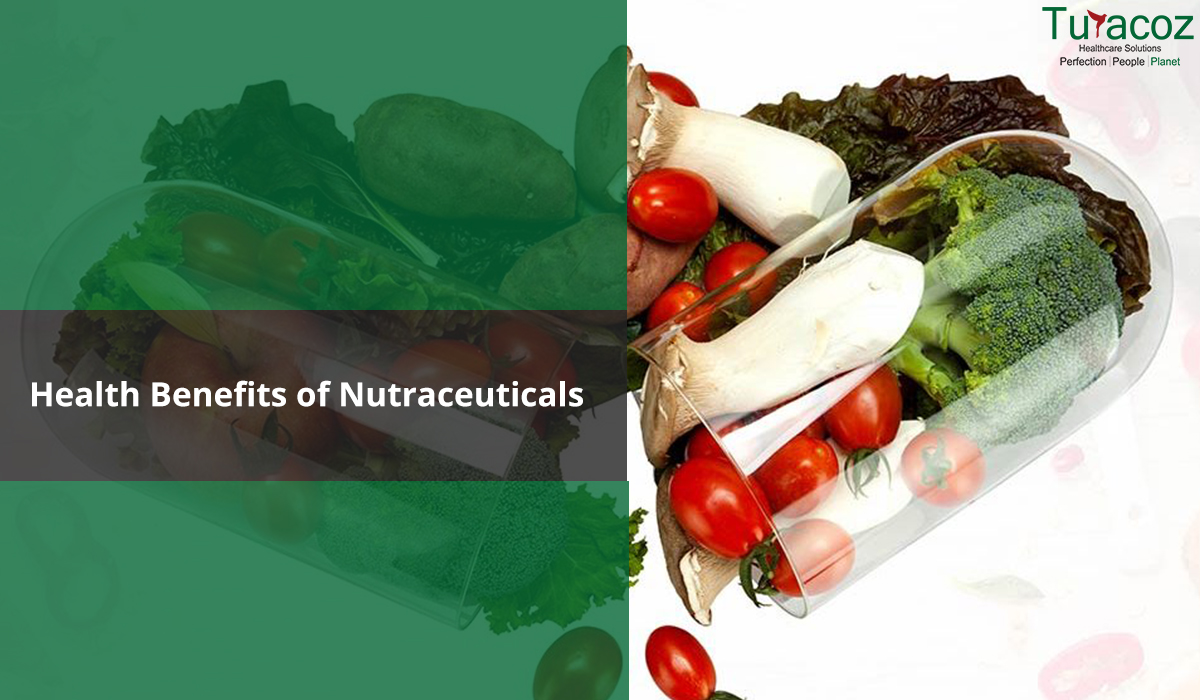Economic development of the people has improved their lifestyle. But the challenge that has arisen with this lifestyle change is increasing the prevalence of ‘lifestyle diseases.’ Lifestyle diseases refers to diseases associated with bad lifestyle choices including food habits. The increased trend of eating junk food is known to be the reason for several diseases (obesity, cardiovascular diseases) and nutritional deficiencies. Due to high cost of treatment of these diseases in the modern science, people have started looking for alternative or complementary treatment options. Thus, nutraceuticals came into focus and are being opted as they fulfill nutritional requirements and have therapeutic benefits.
The word “nutraceutical” was coined from “nutrition” and “pharmaceutical” by Stephen De Felice, founder and chairman of the Foundation for Innovation in Medicine in 1989. It is defined as “a food or parts of food that provide medical or health benefits, including the prevention and treatment of disease”. Nutraceuticals are the pharmaceutically blended products that have both nutritional as well as the medicinal value. This type of product is designed to improve the physical health, and fight against day-to-day challenges such as stress, increase longevity, etc. It is a food supplement that plays a vital role in maintaining a healthy body and provides necessary supplements required for various metabolic processes to regulate body functions and thus protects the body from disease.
According to a Mordor Intelligence Report, the global nutraceuticals market is predicted to reach $671.30 billion by 2024.
Classification of nutraceuticals:
Nutraceuticals can be organized in several ways, depending upon its application and easier understanding. Some classifications can be based on academic instruction, clinical trial design, functional food development or dietary recommendations.
- Based on food availability, they are divided into traditional nutraceuticals, obtained from nature directly, without any changes in the natural form and non-traditional nutraceuticals, foods enriched with supplements or biotechnologically designed crops to boost the nutrients
- Based on mechanism of action, they are further classified with respect to specific therapeutic properties such as anti-microbial, anti-inflammatory, and antioxidants
- Based on chemical nature, these are segmented depending upon their primary and secondary metabolite sources such as isoprenoid derivatives, phenolic substances, fatty acids, carbohydrates, and amino acid-based substances.
Nutraceuticals and their health benefits
Nutraceuticals are known to have therapeutics effects and physiological benefits. They are known to provide protection against various diseases including cardiovascular, obesity, diabetes, cancer, chronic inflammatory disorders, and degenerative diseases. Some of the food sources used as nutraceuticals and their therapeutic effects are discussed below:
- Dietary Fibre– Dietary fibres are not hydrolysed by enzymes secreted by the digestive tract but by microflora in the gut. The benefits of consuming dietary fibres include the retardation of emptying of the gastric juices in the stomach thereby affecting the rate of digestion and the uptake of nutrients, and it improves glucose tolerance and lowers the risk of coronary heart disease, stroke, hypertension, diabetes, obesity and certain gastrointestinal (GI) disorders. Also, an increase in the intake of high fibre food improves serum lipoprotein values, lowers blood pressure level, improves blood glucose control for diabetes, and aids weight loss.
- Probiotics– Probiotics are non-pathogenic, non-toxic anti-bacterial substances. These are resistant to gastric acid and adhere to gut epithelial tissues. Consumption of probiotics decreases the risk of systemic conditions like allergy, asthma, cancer, several infections of the ear and urinary tract. It is also used to treat GI conditions such as lactose intolerance, acute diarrhoea and antibiotic-associated GI side effects.
- Prebiotics– It improves lactose tolerance, has anti-tumor properties, is capable of neutralizing toxins, stimulates the intestinal immune system, and helps reduce constipation, blood lipids and maintains safe blood cholesterol levels.
- Polyunsaturated fatty acids (PUFAs) – These are very essential for all bodily functions and hence known as “essential fatty acids”. It can be only taken through diet. Omega-3-fatty acids are one on the best examples of PUFAs. The three major effects against cardiovascular diseases are anti-arrhythmic, hypolipidemic and antithrombotic. Its benefits are numerous, such as, it can help improve the health of pre-mature infants and patients suffering from asthma, bipolar and depressive disorders, dysmenorrhea and even diabetes. Infant formulas of omega-3-fatty acids nowadays contain docosahexaenoic acid (DHA) along with arachidonic acid, which closely mimic the breast milk. The FDA recommends a maximum of 3g/day intake of eicosapentaenoic acid (EPA) and DHA omega-3 fatty acids, with no more than 2g/day as a dietary supplement.
- Antioxidant vitamins– Vitamins like vitamin C, vitamin E, and carotenoids are collectively known as antioxidant vitamins. These vitamins are self-sufficient and have synergistic effects. They prevent oxidative reactions leading to several degenerative diseases including cancer, cardiovascular diseases, cataracts etc.
- Polyphenols– It has antioxidant, anti-inflammatory, anti-microbial, cardioprotective activities and plays a role in the prevention of neurodegenerative diseases and diabetes mellitus. Also, dietary polyphenols are believed (from in vitro studies) to affect numerous cellular processes like gene expression, apoptosis, platelet aggregation, intercellular signalling that can have anti-carcinogenic and anti-atherogenic implications.
- Spices– These are responsible for lowering of blood cholesterol, prevention, and dissolution of cholesterol gallstones, protection of erythrocyte integrity in hypercholesterolemic condition, hypoglycaemic potential, amelioration of diabetic nephropathy. It also possesses antioxidant effect, anti-inflammatory and anti-arthritic effect, antimutagenic effect/cancer preventing, digestive stimulant action and antimicrobial activity.
People are trying to attain a healthier and a better quality of life by eating more vegetables, fruits, and other plant extracts, taking dietary supplements or nutraceuticals. The development of nutraceuticals and functional foods delivers unique products to the world at large and helps in enhancing consumer confidence. Nutraceuticals are substances that have physiological benefits or provide protection against chronic diseases. They are used to improve health, delay the aging process, prevent chronic diseases, increase life span, or support the structure or functions of the body.






































